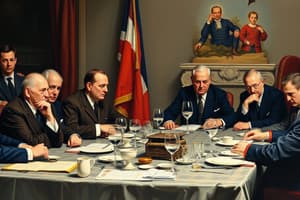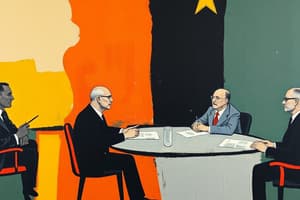Podcast
Questions and Answers
Why did the Allies decide to have a conference at Yalta?
Why did the Allies decide to have a conference at Yalta?
To help decide what would happen to Europe and, in particular, Germany, at the end of the Second World War.
Where is Yalta and why was it chosen as a conference location?
Where is Yalta and why was it chosen as a conference location?
The Yalta Conference was in Russia. It was common ground for the three nations.
Match the countries with their leaders at the Yalta Conference:
Match the countries with their leaders at the Yalta Conference:
United States = Franklin Delano Roosevelt Great Britain = Winston Churchill Soviet Union = Joseph Stalin
Describe the division of Germany and Berlin after World War II.
Describe the division of Germany and Berlin after World War II.
Why do you suppose the Allies chose to divide up Germany and maintain troops in their sectors following the end of WWII?
Why do you suppose the Allies chose to divide up Germany and maintain troops in their sectors following the end of WWII?
What was Truman angry about after the Potsdam Conference?
What was Truman angry about after the Potsdam Conference?
What small piece of information did Truman keep from Stalin and why?
What small piece of information did Truman keep from Stalin and why?
What was the disagreement over reparations and why would the Soviets want a lot from the Germans?
What was the disagreement over reparations and why would the Soviets want a lot from the Germans?
Why do you suppose the Yalta and Potsdam Conferences are seen as factors leading to the Cold War?
Why do you suppose the Yalta and Potsdam Conferences are seen as factors leading to the Cold War?
Flashcards
Why the Yalta Conference?
Why the Yalta Conference?
To decide the fate of Europe and Germany after World War II.
Division of Germany
Division of Germany
Germany was divided into four zones controlled by the USSR, United States, Great Britain, and France.
Why divide Germany?
Why divide Germany?
To demonstrate influence and ensure post-war stability and prevent Germany from rising again.
Truman's Post-Potsdam Anger
Truman's Post-Potsdam Anger
Signup and view all the flashcards
Truman's Secret at Potsdam
Truman's Secret at Potsdam
Signup and view all the flashcards
Reparations Disagreement
Reparations Disagreement
Signup and view all the flashcards
Cold War Origins
Cold War Origins
Signup and view all the flashcards
Study Notes
Yalta Conference
- Aimed to determine the future of Europe and Germany after World War II.
- Location was Yalta, in Russia, chosen for its neutral ground for the participating nations.
Main Participants at Yalta
- United States led by Franklin Delano Roosevelt.
- Great Britain represented by Winston Churchill.
- Soviet Union under the leadership of Joseph Stalin.
Division of Germany
- Germany divided into four occupation zones controlled by the USSR, United States, Great Britain, and France.
- Berlin also split into four sectors to manage post-war governance.
Purpose of Division
- Division aimed to establish administrative control and post-war order to prevent future conflicts.
Truman's Anger at Potsdam Conference
- President Harry Truman felt intense frustration after the Potsdam Conference.
- Increased belief in the necessity of a tough stance against the Soviet Union.
Secret of the Atomic Bomb
- Truman chose not to inform Stalin about the atomic bomb's development.
- Intended to leverage U.S. advantage in negotiations and ensure Japan's surrender before Soviet intervention.
Disagreements on Reparations
- Soviets were allocated to take reparations from their zone and 10% from the western zones.
- U.S. and British leaders expressed concern over the extent of reparations, fearing it was excessive.
Tensions Leading to the Cold War
- Yalta and Potsdam Conferences highlighted significant disagreements and rising tensions among allied leaders.
- The lack of consensus contributed to the dawning of the Cold War era.
Studying That Suits You
Use AI to generate personalized quizzes and flashcards to suit your learning preferences.




